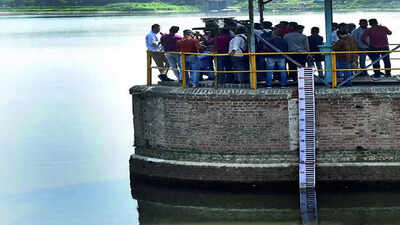Top Searches
- News
- City News
- delhi News
- Water crisis in Delhi, Saurabh Bharadwaj blames illegal Yamuna sand mining in Haryana
Water crisis in Delhi, Saurabh Bharadwaj blames illegal Yamuna sand mining in Haryana

Bharadwaj & others at Wazirabad plant, which is currently running at 63% of its capacity
NEW DELHI: It's not summer yet, but the national capital is already facing the problem of low water level in the Yamuna, leading to restricted supply in many areas. Delhi Jal Board (DJB) vice-chairman Saurabh Bharadwaj alleged on Tuesday that the key reason for it was not the rising temperature but rampant illegal sand mining in the Yamuna on the Haryana side.
Bharadwaj claimed that 32 points could be identified near the Tajewala barrage on the Haryana side on the Google map where illegal mining was on. It has drastically reduced the water flow in the Yamuna from Haryana, affecting the water treatment capacity at the Wazirabad and Chandrawal plants that supply water to central, north and south Delhi, he said. Ammonia level in the water at Wazirabad had increased to 3.1ppm against the treatable level of 0.8ppm.
2 water treatment plants running below capacity
New Delhi: Two major water treatment plants in the city were running between 60% and 80% of capacity due to a drop in the Yamuna level, for which DJB vice-chairman Saurabh Bharadwaj blamed illegal sand mining in Haryana.
According to DJB officials, the Wazirabad plant daily produces 131 million gallons per day (MGD) of water. Now, it is currently producing 82.7MGD due to the shortage of water. Similarly, the Chandrawal plant has a capacity of 100MGD, while it's now producing only 78MGD.
"The sand mafia has stopped Yamuna water released for Delhi at an area some 7-8km from Yamunanagar in Haryana. Sand is being mined indiscriminately and they have made temporary bridges in the middle of the Yamuna for illegal mining and movement of trucks," Bharadwaj said.
"In 2019, too, there were reports of illegal sand mining at Tajewala. We are communicating with the water and irrigation department of the neighbouring state, but it has had minimal effect. This needs to be taken up between the two governments," he added.
Though sand mining is illegal as per court orders, the Haryana government is ignoring the issue, Bharadwaj alleged.
He also requested the public to not use a lot of water during the festival of holi.
Water minister Kailash Gahlot also met DJB officials to discuss the summer plan. According to weather experts, the city may see a longer period of heatwaves, escalating the demand for drinking water. To handle the situation at the macro level, Gahlot has decided to periodically meet officials and frequently visit water treatment plants.
To augment water supply in Delhi, DJB is working on various measures for groundwater augmentation, including installation of tubewells in high water table areas, recharging good quality treated effluents in lakes, and installing RO plants at six locations.
Bharadwaj claimed that 32 points could be identified near the Tajewala barrage on the Haryana side on the Google map where illegal mining was on. It has drastically reduced the water flow in the Yamuna from Haryana, affecting the water treatment capacity at the Wazirabad and Chandrawal plants that supply water to central, north and south Delhi, he said. Ammonia level in the water at Wazirabad had increased to 3.1ppm against the treatable level of 0.8ppm.
TimesView
Summer hasn’t even begun and a water crisis looms in the capital due to an illegal sand mafia. Authorities should deal with the menace quickly and firmly to stop the problem from escalating.
2 water treatment plants running below capacity
New Delhi: Two major water treatment plants in the city were running between 60% and 80% of capacity due to a drop in the Yamuna level, for which DJB vice-chairman Saurabh Bharadwaj blamed illegal sand mining in Haryana.
According to DJB officials, the Wazirabad plant daily produces 131 million gallons per day (MGD) of water. Now, it is currently producing 82.7MGD due to the shortage of water. Similarly, the Chandrawal plant has a capacity of 100MGD, while it's now producing only 78MGD.
"The sand mafia has stopped Yamuna water released for Delhi at an area some 7-8km from Yamunanagar in Haryana. Sand is being mined indiscriminately and they have made temporary bridges in the middle of the Yamuna for illegal mining and movement of trucks," Bharadwaj said.
"In 2019, too, there were reports of illegal sand mining at Tajewala. We are communicating with the water and irrigation department of the neighbouring state, but it has had minimal effect. This needs to be taken up between the two governments," he added.
Though sand mining is illegal as per court orders, the Haryana government is ignoring the issue, Bharadwaj alleged.
He also requested the public to not use a lot of water during the festival of holi.
Water minister Kailash Gahlot also met DJB officials to discuss the summer plan. According to weather experts, the city may see a longer period of heatwaves, escalating the demand for drinking water. To handle the situation at the macro level, Gahlot has decided to periodically meet officials and frequently visit water treatment plants.
To augment water supply in Delhi, DJB is working on various measures for groundwater augmentation, including installation of tubewells in high water table areas, recharging good quality treated effluents in lakes, and installing RO plants at six locations.
Start a Conversation
FOLLOW US ON SOCIAL MEDIA
FacebookTwitterInstagramKOO APPYOUTUBE









